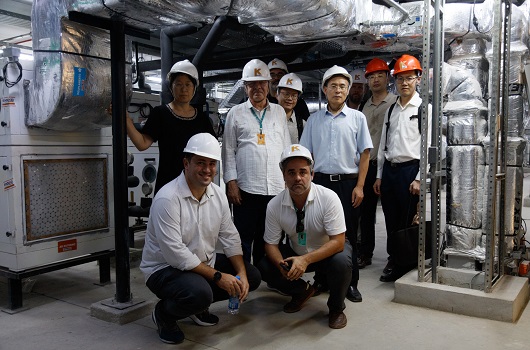Fiocruz signs memorandum of understanding with China National Center for Bioinformation
31/10/2024
Cristina Azevedo (Fiocruz News Agency)
The Center for Technological Development in Health (CDTS/Fiocruz) and China National Center for Bioinformation (known as CNCB) signed a memorandum of understanding (MoU) on Tuesday (10/22) for collaboration in the areas of Bioinformatics and Big Data in Biological Sciences. The document envisages not only partnerships in research and education, but also with a view to tackling national, regional and global challenges.
The director of the CDTS, Carlos Morel (in the center), and the director of the CNCB, Yun-Gui Yang (on the right), during the visit of the Chinese delegation to the new building of the Center (photo: Pedro Linger/Fiocruz)
The formal signing of the document took place during the conference commemorating 50 years of Brazil-China relations, at the Brazilian Academy of Sciences (ABC), in Rio de Janeiro, with the director of the CNCB, Yun-Gui Yang, and the director of the CDTS, Carlos Morel, who represented the Foundation's vice president for Production and Innovation in Health, Marco Krieger. The signing was followed on Wednesday (10/23) by a visit to Fiocruz's Manguinhos Campus by the CNCB delegation, visiting the new CDTS building, the Mourisco Castle, with a working meeting held at the Center for International Relations in Health.
"Professor Yang is the director of one of the largest computer centers in China and is inaugurating an even larger center a hundred kilometers from Beijing, which I visited last year," said Carlos Morel. "The idea is to use their infrastructure in the area of bioinformatics and biosciences, particularly in training young people, and in a partnership in various areas of bioinformatics, particularly in the field of pathogen genome sequencing," he added.
Talent exchange
The CNCB is considered an important biodata infrastructure, with state-of-the-art facilities and a global hub for big data bioinformatics services, innovation and entrepreneurship. The agreement paves the way for the exchange of researchers and students, exploring opportunities for research collaboration and participation in conferences.
"We came intending to create a real collaboration on projects related to life sciences and medicine, as well as exchanging talents, such as young scientists and students," explained director Yang. "Our goal is for the new generation on both sides to get to know each other by working, studying and exchanging places. I think it will be beneficial for both sides."
Four specific fields are of particular interest in the collaboration: the characterization of antiviral resistance mechanisms; fusion of clinical-epidemiological-immunological-omics data; gene therapy based on nanostructures and synthetic biology; and machine learning approaches to take advantage of large-scale multi-omics data, as well as other related fields that may emerge. Morel highlights two major areas in which the CDTS has been working hard: antivirals, in the project led by Thiago Moreno; and a series of modern diagnostics, led by David William Provence in partnership with Salvatore Giovanni De Simone.
"They have developed a very modern diagnostic technology, just published in Vaccines, a new approach to diagnosing Chagas, and they are also targeting COVID-19, syphilis, oropouche," said Morel. "There are two major lines that depend fundamentally on the sequencing of pathogen genomes. So the support of a large center in China, which has this technology and data, shared with us, can be a good thing," added the CDTS director.
Expected to last five years, the document provides for setting up a working group. "The idea is that the future CDTS building can house visiting researchers in its biosafety laboratories and also function as a Fiocruz innovation hub," said Marco Tulio Castro, deputy general coordinator of Strategic Planning and Management at CDTS.


